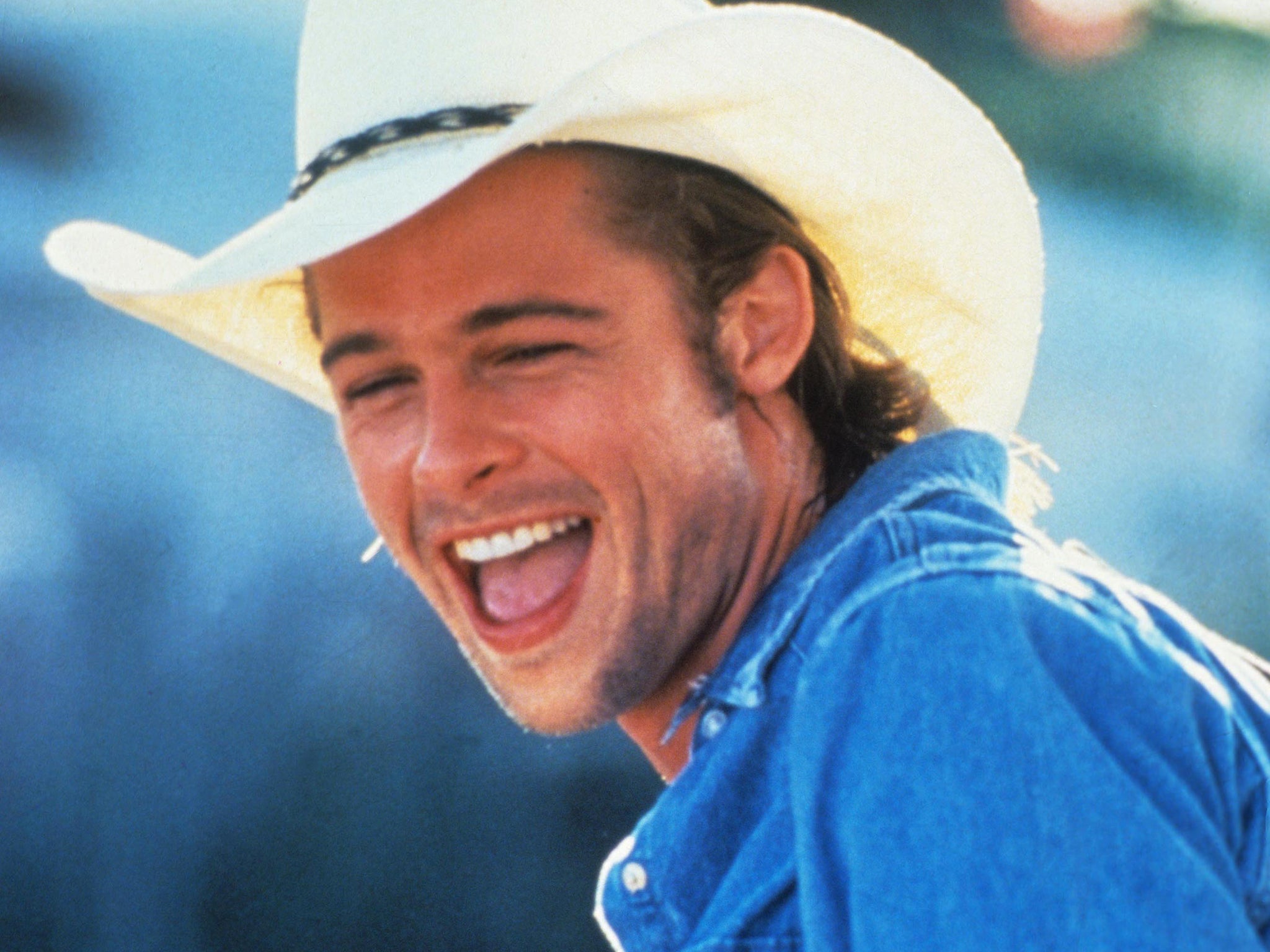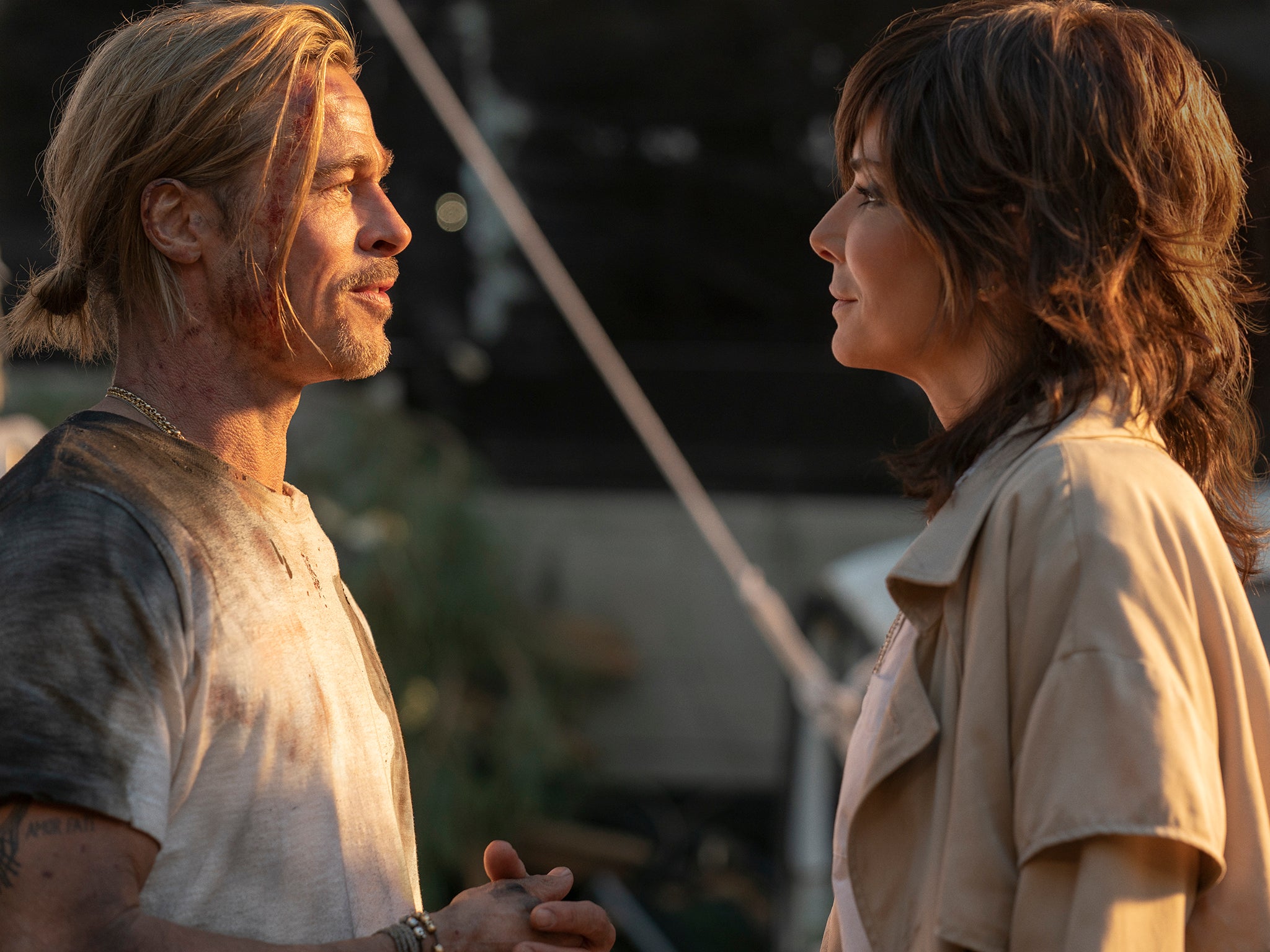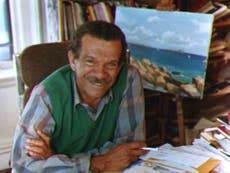Brad Pitt is one of the world’s best movie stars – but why is he still underrated as an actor?
The Oscar-winning actor and super-producer is endlessly talked about, well-liked and – based on the imminent success of his latest film ‘Bullet Train’ – still box office gold. But Geoffrey Macnab can’t help but wonder why critics can’t separate his celebrity from his talent

He is the wine-loving entrepreneur behind Fleur de Miraval champagne, a sparkling rosé vintage that retails at over £300 a bottle. He is the owner of Plan B, the highly respected production company whose credits include Oscar winners like 12 Years a Slave, Moonlight and Minari. He has a strong interest in architecture and 22 years ago co-wrote a book about one of California’s most famous buildings, the Robert R Blacker House in Pasadena. Earlier this summer, he bought the $40m DL James house, a stone bungalow in Carmel, that is also considered an architectural masterpiece. He is known for his progressive politics and charity work.
These details make Brad Pitt sound like the typical philanthropic business executive, renaissance man and Hollywood insider; part of the liberal Tinseltown elite. That, though, is only part of the Pitt story. The 58-year-old actor has already twice been voted People Magazine’s “Sexiest Man Alive” and is “maybe the greatest heartthrob of all time”, according to GQ. Thanks to his marriages to – and divorces from – the equally starry Jennifer Aniston and Angelina Jolie, he remains an unending source of fascination for gossip columnists. Fans adore him but also take a ghoulish pleasure when he becomes embroiled in scandal, for example over an alleged episode of drunken rage on a private jet.
Pitt is back on screen this week in a new action movie Bullet Train. He plays Ladybug, a grizzled, fatalistic but still handsome assassin wearing big black spectacles and a bucket hat. His handler, Sandra Bullock, sends him on a mission to retrieve a briefcase full of cash and gold ingots on a high-speed bullet train travelling from Tokyo to Kyoto. This is Pitt reprising the laidback action schtick that was so effective – and which won him an Oscar – in Quentin Tarantino’s Once Upon a Time in Hollywood. He may be a cold-blooded killer, but he is one with old-world courtesy and a very dry sense of humour. When other assassins, who are also after the briefcase, come after him with guns, snakes, knives and poison, he never gets too perturbed. Even during the film’s most hair-raising moments, Pitt’s character seems to be winking at the audience. Bullet Train will appeal to fans of stylish, tongue-in-cheek, overdetermined action flicks like the Keanu Reeves-starring John Wick franchise or Netflix’s recent release The Gray Man. Pitt, now in his late 50s, plays the role with his customary elan. The film has received patchy reviews. Endless puns have been made about its plot veering off the rails. As ever, though, the actor has escaped without a scratch on his reputation. After all, everybody loves Brad.
And yet the perception remains that for all his popularity, Pitt is still underrated as an actor. Critics can’t quite detach his performances from his celebrity persona. To some, he remains the male model with “smouldering good looks” (as British newspapers used to describe him) who appeared in sultry denim ads at the start of his career in the early 1990s. Pitt has never fully escaped from the stereotyping that has dogged him since he played the object of desire in Ridley Scott’s 1991 road movie Thelma and Louise. “Shifty but sexy” was how The Chicago Sun-Times film critic Roger Ebert described him.
Quentin Tarantino recently suggested that Pitt is a natural successor to the rugged, charismatic and good-looking stars of the Seventies. But unlike Steve McQueen, Paul Newman and Robert Redford, he has never been accorded the same respect. Even before his film career began in earnest, Pitt was already preyed on by gossip columnists. UK audiences first encountered him in the late 1980s when he appeared in Dallas. He played clean-cut teenager Randy who was dating Jenna Wade’s daughter, Charlie (Shalane McCall). The four-episode cameo provided enough fodder for tabloids to sink their teeth into a new victim. Around this period, the press enjoyed speculating about whether the former heavyweight boxing champ Mike Tyson would beat Pitt to a pulp after he began a relationship with Tyson’s ex-wife Robin Givens. “Brad’s no coward but he’s also no fool… he knows Tyson could put his name on the obituary page,” a “friend” of the actor told the Sunday World newspaper.
Veteran US director Mel Damski gave Pitt one of his first screen roles in the college-set romcom Happy Together (1989). The young actor had a bit part in the film, but Damski remembers him vividly. “He [Pitt] was a wide-eyed kid who had just moved from Missouri to Los Angeles,” Damski tells The Independent. “He only had one line in the movie, but he loved being on set and watching everything that was going on because this was a whole new world for him. I can tell you this, he’s a good guy. He was lovely to work with. I heard he did not change. I was not surprised by the success he had after that. He just had a very likeable quality.”
Strangely, one of Pitt’s most distinctive early roles came in a film that bombed at the US box office. In Tom DiCillo’s Johnny Suede (1991), he played a Ricky Nelson-loving would-be rock star with a sky-scraping pompadour that even Marie Antoinette might have thought on the extravagant side and black suede shoes. DiCillo described the character as “a naive, schizophrenic fool” who was also a “smart, sexy guy with intense energy”. Johnny Suede, which co-starred Catherine Keener, Samuel L Jackson and Nick Cave, was far too stylised and offbeat for mainstream American tastes. Its lead actor, though, showed he wasn’t just the hunk from those Levi’s commercials. Pitt had a strange quirky charm and a flair for comedy. He could play dreamy romantic heroes but was always ready to take on roles as delinquents and outsiders. Not long after, he was cast as the disturbed mental patient Jeffrey Goines in Terry Gilliam’s sci-fi classic 12 Monkeys (1995), Nor was Pitt scared by the darkness of David Fincher’s Se7en (1995), in which he played a young detective investigating a serial killer.
Pitt was a well-spoken and melancholic vampire in Neil Jordan’s Interview with the Vampire (1994), produced by Stephen Woolley and co-starring a young Kirsten Dunst. “He [Pitt] just was a very, very nice guy,” Woolley tells The Independent, sounding a familiar refrain. “He was very accommodating, quite relaxed. He wasn’t stressed. He was carefree in a way, but he was trying to learn as much from Neil Jordan as he could. There were a lot of reports about there being spats with [co-star] Tom [Cruise] but most of that was invisible to my eye. I didn’t ever see them fall out. They seemed to get on incredibly well together, but I think the press was trying to wind things up.” It was a tough production, with much of the location work filmed in Louisiana’s sweltering heat. “The first night we shot, most of the make-up fell off because it was 100 degrees humidity,” the producer recalls. There was also a lot of “scurrilous gossip” around the adaptation, which the original novel’s author Anne Rice had initially disowned. However, once Rice saw the completed movie, she acknowledged, as Woolley puts it, that “she was completely wrong, and that Tom and Brad were the perfect Lestat and Louis”.
The producer sums up the secret of Pitt’s success in a few pithy words: “He [Pitt] is charismatic. Guys like him. Women like him. He has wide-based appeal… he can play guys from the sticks and intellectuals,” Woolley says of an ever-adaptable star he believes would have made a perfect fit in the old Hollywood studio system
Pitt’s innate charm meant that he could take on complex and even villainous roles while maintaining an audience’s sympathy. With his versatility still largely overlooked by critics, Pitt was assembling an extraordinarily varied body of work. He starred in big studio pictures like Ocean’s Eleven while also appearing in revisionist westerns like The Assassination of Jesse James by the Coward Robert Ford, and Alejandro Gonzalez Inarritu’s sprawling multi-character drama, Babel (2006). He was equally convincing as the swaggering alpha male Tyler Durden in Fincher’s Fight Club (1999) as he was the man-ageing-in-reverse in Fincher’sThe Curious Case of Benjamin Button. He played both a Wall Street trader in 2015’s The Big Short as well as a strict patriarch in rural Fifties Texas in Terrence Malick’s The Tree of Life (2011), and the dim-witted fitness instructor in the Coen brothers’ screwball comedy Burn After Reading (2008). He wasn’t the obvious choice to play the astute, wheeler-dealer baseball manager Billy Beane in Moneyball (2011) but upon the film’s release, nobody questioned his performance.
By then, though, the media had become so distracted by the celebrity circus of Pitt’s private life that his chameleon-like shapeshifting feats on screen were hardly noticed. It’s revealing to watch Roxane Schlumberger’s 2021 documentary Brad Pitt: Breaking Hollywood. It begins as a conventional account of Pitt’s career; how he first came to Hollywood from Missouri with only $300 in his pocket, like a latter-day Dick Whittington, taking a series of dead-end jobs before quickly breaking through into the industry. However, any attempt at a meaningful analysis of his career is abandoned in favour of fervent showbiz gossip about Brad and Jennifer, and then Brad and Angelina – or “Brangelina”, as they were christened. When Jolie announced her pregnancy in 2006, the documentary claims the child “was the most anticipated baby since Jesus Christ”.

Despite the Oscars and Golden Globes, Pitt is still not taken altogether seriously. Some critics have found him “defensive” and lacking daring. “Pitt … is a capable and inventive actor, but he will only be a great one if he risks breaking himself open on screen,” the New York Times critic AO Scott suggested of him. As he approaches 60, Pitt may not be as svelte and slender as he was in his denim-wearing Thelma and Louise days, but in Bullet Train, he easily holds his own against antagonists who are far younger, both in the fight sequences and in the moody close-ups.
As for the “media assault” that Pitt has suffered since the start of his career, it doesn’t seem to have held him back. He is still speeding ahead. Having just come off Bullet Train, he is soon to star in a new Hollywood Formula One film for which he will receive driving lessons from Lewis Hamilton. More than 30 years after Thelma and Louise, the actor’s ability to charm audiences hasn’t abated in the slightest – but nor has the suspicion of critics about an actor to whom everything seems to come so easily.
‘Bullet Train’ is in cinemas now






Join our commenting forum
Join thought-provoking conversations, follow other Independent readers and see their replies
0Comments